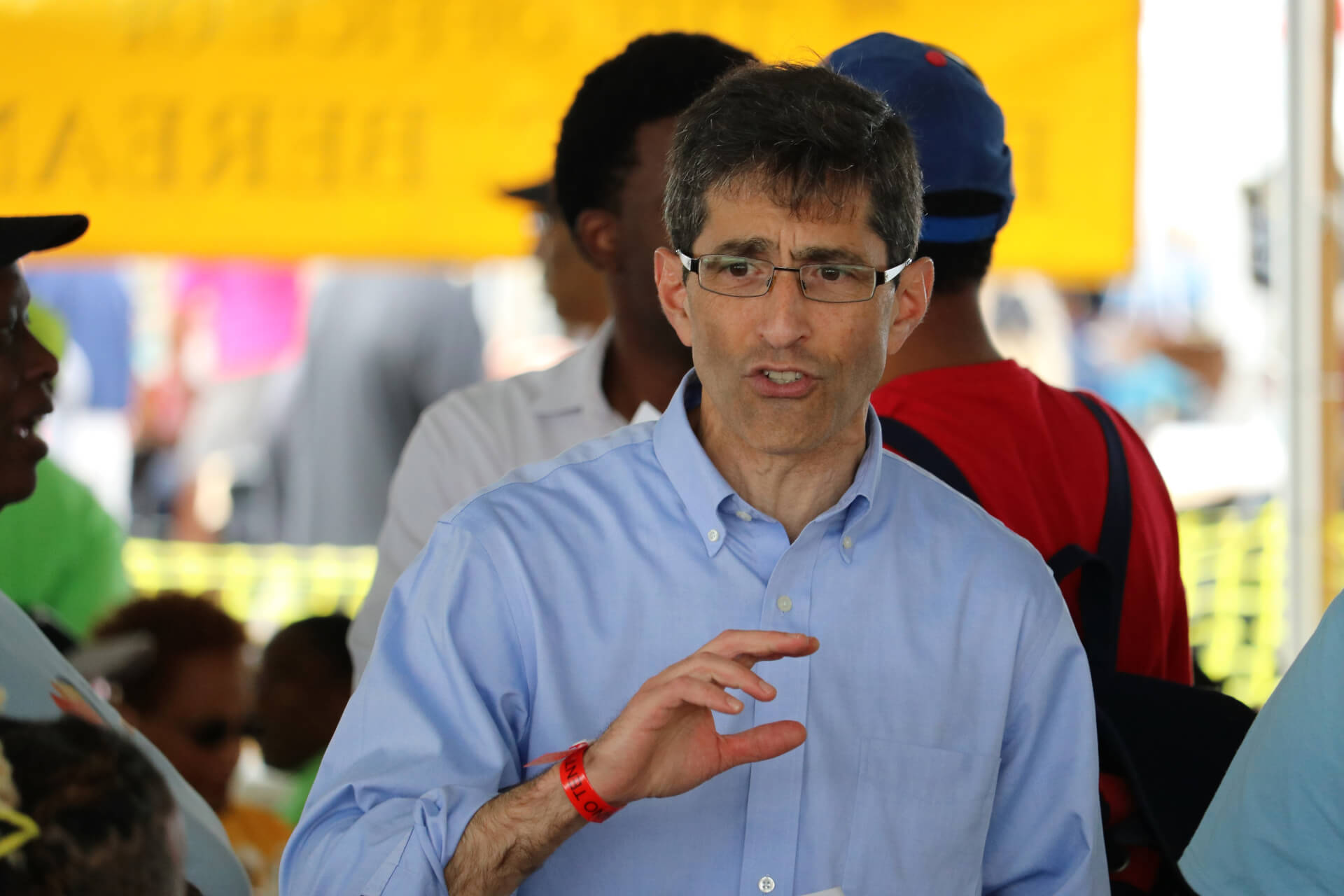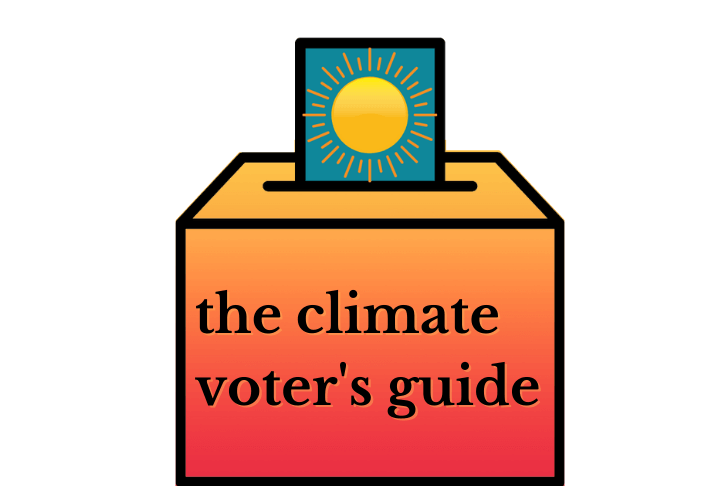
Eighth in a series.
Jon Baron isn’t the first policy wonk in history to run for governor of Maryland.
But he may be the first to come from the especially wonky world of what’s known as evidence-based policy. He’s worked for federal agencies and philanthropies that study what’s worked in one place and try to circulate the idea more widely to see if they can be applied elsewhere.
So when the first-time candidate for political office talks about climate change, the Democrat doesn’t offer impassioned words about corporate polluters and rising sea levels and environmental justice and the apocalypse to come. He talks instead about something called RGGI (pronounced “Reggie”).
That’s the Regional Greenhouse Gas Initiative, a coalition of a dozen Northeastern and Mid-Atlantic states that run a cap-and-trade program designed to limit carbon emissions from power plants and make polluters pay. To Baron, RGGI is a model for how state governments, working cooperatively, can begin to tackle the multiple challenges wrought by climate change.
“Maryland has been a leader in both Republican and Democratic administrations on climate change,” the 58-year-old policy analyst said in a recent interview. “Maryland has actually led the country in greenhouse gas emissions reductions over the past 15 years, literally, while maintaining robust economic growth. I think there’s credit on both sides of the aisle for this, including Gov. [Lawrence J.] Hogan (R). And RGGI is a top reason.”
Baron also speaks admiringly of the Transportation Climate Initiative, a fledgling regional program not unlike RGGI that seeks to establish a carbon trading program to minimize emissions from the transportation sector. While Maryland officials have informally worked on the planning of the group, the Hogan administration last year took a pass on joining formally — for now.
That, in Baron’s view, was a mistake. But if there are more opportunities for Maryland to participate in other regional alliances that address climate change, a Gov. Baron would be all in. These programs, he argues, make governments and private companies partners in the battle against climate change, and offer the companies guidance for how to compensate the public for the damages they’ve caused.
“I think there’s a lot of advantages to that,” he said. “It’s the appropriate breakout of responsibilities for government and industry. It lets industries make the decisions to meet those emissions reduction goals in the most cost-effective way, whether it’s solar or wind or carbon capture or hydroelectric or whatever, based on the latest technologies, based on the market and all of that. It’s probably the most cost-effective way to make enormous [carbon] reductions.”
Baron concedes that charging energy and transportation companies fees for the carbon they produce could result in “modestly” higher gas, electric and commuting costs for consumers, but said it’s state government’s responsibility to make sure that the families that can least afford it are compensated in some way.
“I want to talk more with industry leaders to make sure that when we do this, it minimizes economic disruptions and can be done in a way that boosts the Maryland economy,” he said.
Baron worked at the Department of Defense during the Clinton administration, and one of the programs he ran provided “early stage funding” for startup technology companies — sometimes as many as 1,000 a year — that were having trouble raising capital for the private sector. Companies would be leap-frogged to the top of the government’s priority list for grants if they lined up some private funding on their own.
“It’s very high risk, but the rewards if it’s successful benefit everybody,” Baron said.
The candidate would like to see state government launch a similar funding program to seed green technologies in Maryland. The funding, he said, could lead to advances in electric vehicles and public buses, green buildings, solar panels on buildings, the development of other renewable energy industries, and Chesapeake Bay clean-up.
Baron wants the state to invest wisely, to make sure funding isn’t going to technologies that will soon be obsolete.
“The world is full of examples where the government tried to pick technologies, including the C&O Canal, right by my house, that was outmoded 20 years later by the railroads,” he said.
Baron said he would work to ensure that the evaluation process for any green technologies results in “government being neutral.”
“How we get there, which technologies we use, should be left to a tremendous degree to the marketplace,” he said.
‘Engage them while dealing with the least amount of disruption’
Given his faith in the marketplace, Baron asserted that Maryland will need to rely on natural gas and nuclear power for the foreseeable future to power its electric grid. Using gas, he said, “is better than coal-burning power plants.” As for continuing to use nuclear, which currently represents about 80% of the fossil-free fuels generated in Maryland, “As long as it’s safe and demonstrated to be safe, I’m not opposed to that.”
Baron said the state deserves credit for continuing to meet federally mandated pollution clean-up goals for the Chesapeake Bay, though he laments that upriver states aren’t being as compliant. He said he would reach out to Eastern Shore communities where residents have been reluctant to embrace aggressive climate measures that benefit the Bay, particularly with “market-based solutions” that preserve and improve the local economy.
“You’ve got to engage them,” he said. “There are ways of doing it in which you can engage them while dealing with the least amount of disruption.”
But Baron said he would not ignore “the urgency” of climate change for political expediency.
“My approach is consistent with the tagline of my campaign, which is ‘Let’s do what works.’ The goal is to have ambitious reductions of greenhouse gas emissions, building on what has already worked, like RGGI, which has bipartisan support, and do it in a way that allows for robust economic growth.”
Baron’s personal climate hero is…
Asked to name his personal climate hero — a question Maryland Matters posed to all the Democratic contenders for governor — Baron named a fellow member of the Clinton administration, former vice president Al Gore (he was not the only Democratic candidate to do so).
“He’s been a leader on this from the beginning,” Baron said, “in policy, awareness, proposals and underscoring the urgency of it, describing what is happening with greenhouse gas emissions and rising temperatures in a very accessible way for the public.”
Baron said Gore is proof that you don’t have to be an officeholder to have profound impact on policy.
“He’s one of those politicians, like maybe Jimmy Carter, who’s had an enormous impact after they’ve left office,” he said. “I’ve always had tremendous respect for him as a person. He may not have been a natural politician, but he was in it for the right reasons and a good man.”
Coming Tuesday: An interview with Wes Moore. Click here for other stories in the Climate Voter’s Guide series.






 Creative Commons Attribution
Creative Commons Attribution